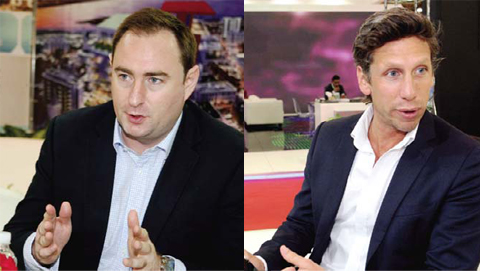 John Treacy and Adrian Endersby
John Treacy and Adrian EndersbyKUWAIT: Kuwaitis are diversifying investments both at home and abroad, specifically in the real estate sector. According to the World Investment Report of 2015, released by the United Nations Conference on Trade and Development (UNCTAD), Kuwait is the Middle East's largest and the world's seventh largest foreign investor. Many exhibitions related to real estate have been held in Kuwait recently, the latest of which kicked off on Monday at the Kuwait International Fairgrounds in Mishref.
SevenCapital, a real estate investor and developer in the commercial, residential and hospitality sectors based in central and northern UK, is participating in the RIE 2016 expo. Top Real Estate, the marketing arm of SevenCapital, revealed it has a good number of customers from this part of the world. SevenCapital is currently promoting its newest project in Birmingham, 'The Kettleworks', which is expected to be delivered to investors by 2017. It is located in the Jewelry Quarter, with studios and one, two and three bedroom apartments. Adrian Endersby, Business Development Manager of Top Real Estate, said Birmingham is 1.5 hours away from London and considered the second city of England.
"The population of Birmingham is about 3.7 million, but the city proper is not as crowded compared to London, and is considered as one of the best cities in the world," he said. "Birmingham preserved its buildings in their original form and structure but many refurbishments have been taking place. Kuwaitis are really pleased to know that this city is near the capital city of London - they want to live in a quiet but also very dynamic place. Birmingham is the most livable city in England, and this is the best time to buy properties and expect huge returns on investments," Endersby said.
Lots of real estate and infrastructure developments are in the works in Birmingham, but also many completed projects such as shopping malls and plenty of commercial establishments. Endersby said rentals are also far lower than the capital. "The people there are warm and friendly. This is the most populous British city outside London, and Birmingham has the UK's top quality of life. People want to live near their workplaces and walk and not be stuck in traffic," he said.
Endersby noted that Birmingham is currently constructing a high-speed train line that could shorten the travel to London from 1.5 hours to 45 minutes. "International banks are setting up retail centers in Birmingham and they are redeveloping very quickly. This can attract thousands of employees each year who need apartments and houses in Birmingham. London is high-value, and has capital appreciation, but the rental value in London is far lower compared to Birmingham. You can expect rental income in London at 3-5 percent while in Birmingham it is about 8 percent. The rental amount yield can be about 18 percent per year," he added.
Enderby pointed out that Birmingham's real estate is not reliant on international sales. Many in the UK seized the opportunity for investment in the past years, so when they want to sell, they have the local market to buy it. "The good thing about Birmingham is that we are receiving a good amount of investors. We have many investors from the Middle East such as Kuwait, Qatar and the United Arab Emirates," he stressed.
The units are sold to investors with 30-percent down payment. The remaining 70 percent is up to investors to pay and the keys will be given to owners after the completion of the payments, said Endersby. The property is secured with 24-hours security. Kuwaitis and other nationals can own properties in the UK 100 percent for 125 years. "The property is virtually yours and no one can take it away from you. We have a team of lawyers at the Top Real Estate that can help prepare the documentations," he said. John Treacy, Global Sales Manager of SevenCapital noted that most of the properties they developed are mainly sold in the local market, and only 30 percent are sold to international or overseas investors. "Fifty percent of these are sold in Asia, mostly China, Hong Kong and Singapore, while the other 50 percent to investors from GCC countries," he said.
By Ben Garcia










